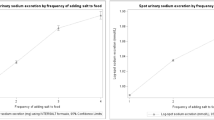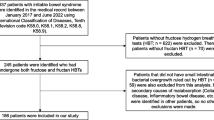Abstract
Little is known regarding the effects of Ramadan fasting on common gastrointestinal symptoms. The aim of this study was to assess the alterations of these symptoms in a healthy Iranian adult population during Ramadan. In a cross-sectional study, self-administered questionnaires were used to evaluate the alterations in seven groups of gastrointestinal symptoms (esophageal symptoms, dyspeptic symptoms, bloating and abdominal distension, constipation, diarrhea, abdominal pain, and nausea) after Ramadan. A total of 900 individuals participated in the study. Almost 87 % of participants reported to fast for at least 2 weeks during Ramadan. After adjusting for potential confounders, we found no relationship between alteration in frequency of gastrointestinal symptoms and Ramadan fasting, except for constipation which increased significantly after Ramadan fasting (odds ratio 1.99, 95 % confidence interval 1.05–3.80, P < 0.05). In addition, those who fasted for at least 2 weeks reported to experience severe or very severe constipation-related symptoms three times more in comparison with those who fasted for less than 2 weeks (P < 0.05). There was no relationship between severity of other gastrointestinal symptoms and Ramadan fasting. We found that Ramadan fasting does not increase frequency and severity of common gastrointestinal symptoms in the general population except for constipation that may be experienced more frequently and severely among those who fast for 2 weeks or more.

Similar content being viewed by others
References
Aadil, N., Houti, I. E., & Moussamih, S. (2004). Drug intake during Ramadan. British Medical Journal (BMJ), 2329(7469), 7787–7792.
Adibi, P., Keshteli, A. H., Esmaillzadeh, A., Afshar, H., Roohafza, H., Bagherian-Sararoudi, H., et al. (2012). The study on the epidemiology of psychological, alimentary health and nutrition (SEPAHAN): Overview of methodology. Journal of Research in Medical Sciences, 17(5), S291–S297.
Afifi, Z. E. (1997). Daily practices, study performance and health during the Ramadan fast. Journal of the Royal Society of Health, 117(4), 231–235.
Al-Kaabi, S., Bener, A., Butt, M. T., Taweel, M., Samson, S., Al-Mosalamani, Y., & Al-Musleh, A. (2004). Effect of Ramadan fasting on peptic ulcer disease. Indian Journal of Gastroenterology, 23(1), 35.
Alkandari, J. R., Maughan, R. J., Roky, R., Aziz, A. R., & Karli, U. (2012). The implications of Ramadan fasting for human health and well-being. Journal of Sports Sciences, 30(sup1), S9–S19.
Amini, E., Keshteli, A. H., Jazi, M. S., Jahangiri, P., & Adibi, P. (2012). Dyspepsia in Iran: SEPAHAN systematic review No. 3. International Journal of Preventive Medicine, 3(Suppl 1), S18–S25.
Azizi, F. (2010). Islamic fasting and health. Annals of Nutrition & Metabolism, 56(4), 273–282.
Bener, A., Derbala, M. F., Al-Kaabi, S., Taryam, L. O., Al-Ameri, M. M., Al-Muraikhi, N. M., & Al-Mansoor, T. M. (2006). Frequency of peptic ulcer disease during and after Ramadan in a United Arab Emirates hospital. Eastern Mediterranean Health Journal, 12(1–2), 105–111.
Daneshpajouhnejad, P., Keshteli, A. H., Sadeghpour, S., Ardestani, S. K., & Adibi, P. (2012). Bloating in Iran: SEPAHAN systematic review No. 4. International Journal of Preventive Medicine, 3(Suppl 1), S26–S33.
Darvish, M. S. (2002). Relative frequency of minor digestive symptoms in healthy fasting Muslims and their relation to dietary pattern. Medical Journal of Mashhad University of Medical Sciences, 41(62), 59–66.
Emami, M., & Rahimi, H. (2006). Effects of Ramadan fasting on acute upper gastrointestinal bleeding due to peptic ulcer. Journal of Research in Medical Sciences, 11(3), 170–175.
Fazel, M. (1998). Medical implications of controlled fasting. Journal of the Royal Society of Medicine, 91(5), 260–263.
Iraji, N., Keshteli, A. H., Sadeghpour, S., Daneshpajouhnejad, P., Fazel, M., & Adibi, P. (2012). Constipation in Iran: SEPAHAN systematic review No. 5. International Journal of Preventive Medicine, 3(Suppl 1), S34–S41.
Jahangiri, P., Jazi, M. S., Keshteli, A. H., Sadeghpour, S., Amini, E., & Adibi, P. (2012). Irritable bowel syndrome in Iran: SEPAHAN systematic review No. 1. International Journal of Preventive Medicine, 3(Suppl 1), S1–S9.
Leiper, J. B., & Molla, A. M. (2003). Effects on health of fluid restriction during fasting in Ramadan. European Journal of Clinical Nutrition, 57(Suppl 2), S30–S38.
Ozkan, S., Durukan, P., Akdur, O., Vardar, A., Torun, E., & Ikizceli, I. (2009). Does Ramadan fasting increase acute upper gastrointestinal haemorrhage? The Journal of International Medical Research, 37(6), 1988–1993.
Pirsaheb, S., Pasdar, Y., Navabi, S. J., Rezaei, M., Darbandi, M., & Niazi, P. (2013). Fasting consequences during Ramadan on lipid profile and dietary patterns. Journal of Fasting and Health, 1(1), 6–12.
Sadeghpour, S., Keshteli, A. H., Daneshpajouhnejad, P., Jahangiri, P., & Adibi, P. (2012). Ramadan fasting and digestive disorders: SEPAHAN systematic review No. 7. Journal of Research in Medical Sciences, 17(Suppl1), S150–S158.
Sadiya, A., Ahmed, S., Siddieg, H. H., Babas, I. J., & Carlsson, M. (2011). Effect of Ramadan fasting on metabolic markers, body composition, and dietary intake in Emiratis of Ajman (UAE) with metabolic syndrome. Diabetes, Metabolic Syndrome and Obesity: Targets and Therapy, 4, 409.
Tavakkoli, H., Haghdani, S., Emami, M. H., Adilipour, H., & Tavakkoli, M. (2008). Ramadan fasting and inflammatory bowel disease. Indian Journal of Gastroenterology, 27(6), 239–241.
Acknowledgments
This study was financially supported by the Vice Chancellery for Research & Technology, Isfahan University of Medical Sciences, Isfahan, Iran. We wish to thank all participants of the study for their excellent cooperation.
Author information
Authors and Affiliations
Corresponding author
Rights and permissions
About this article
Cite this article
Keshteli, A.H., Sadeghpour, S., Feizi, A. et al. Evaluation of Self-Perceived Changes in Gastrointestinal Symptoms During Ramadan Fasting. J Relig Health 56, 1620–1627 (2017). https://doi.org/10.1007/s10943-015-0160-0
Published:
Issue Date:
DOI: https://doi.org/10.1007/s10943-015-0160-0




